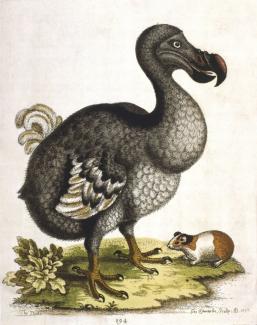Summer Special
The shattered soul of Mauritius

Five hundred years ago, the island of Mauritius must have been a paradise. There were no people or other predators. The island was divided between giant tortoises and dodos, flightless birds that were about one meter tall. Then came the Europeans. The list of things that were destroyed by them and the animals they introduced is long; it includes the giant tortoises and the giant birds. The latter were only found there. They are thought to have gone extinct around the end of the 17th century.
Today, the dodo is the national animal of Mauritius and a symbol of a lost paradise. Therefore it is no surprise that it plays an important role in the latest novel by Jean-Marie Gustave Le Clézio: the protagonist, Jérémie Felsen, a French scientist, travels to Mauritius in order, ostensibly, to search for traces of the dodo. In reality, he is searching for the history of his family. The novel is named after the estate that his family lived on for generations: Alma. This homeland was also a victim of destruction.
And there is one more dodo in the book: it is the nickname of Dominique Felsen, the other first-person narrator, who comes from the “wayward branch” of the family. Dodo, who grew up in Alma and is inextricably linked with Mauritius, tells his own, personal story, which is marked by illness, poverty and exclusion. He also sets off on a journey, but in the other direction: to France. Both stories run parallel to one another, with the family story providing points of contact.
It is obvious that Le Clézio’s personal history played a big role in the creation of the novel. The 80-year-old author, who won the Nobel Prize for literature in 2008, has his own family roots in Mauritius. He lived there for a time as a child and is a citizen of both France and the island nation. He visits Mauritius regularly, and several of his novels and stories take place there. Travel and departure, nature and its destruction, a comparison of different ways of life, colonialism and its consequences: many of the themes that Le Clézio explores in his other books also recur in this late work.
In Alma, Mauritius is, on the one hand, a place of longing and the antithesis to life in Europe. On the other hand, the paradise has been destroyed, which the Felsen family is partly responsible for, at least indirectly. Racism and inequality, the consequences of colonial rule and slavery, persist in present-day society. When the descendants of the white plantation owners have a party, the mess is cleaned up by the descendants of the African slaves who were forced to toil on the plantations. Their children are only allowed to watch from the other side of the fence. A Dutch pilot exploits an underage prostitute whom Jérémie Felsen himself has his eye on. Reprehensible behaviour in this novel is never confined to the behaviour of others: the protagonist is part of the problem and knows it.
It is also clear in Le Clézio’s work that society is not just black and white, but multi-coloured. One example is the character of Aditi, the descendant of Indian plantation workers who came to Mauritius after slavery was abolished. They surely came out of desperation, but not by force, which is nevertheless progress. Nowadays Mauritians of Indian descent make up around two-thirds of the population and dominate the politics and economy of the island nation.
After she is raped, Aditi takes her life into her own hands. She defies social conventions and lives in the forest, where she also gives birth to her child alone. This connection to nature, which stands in opposition to Europe’s urban and technology-driven lifestyle, is another strong theme in Le Clézio’s work. But in modern Mauritius, shopping centres, streets and hotels are sprouting up everywhere. The world that Jérémie Felsen is looking for is in the process of disappearing. At the end of the story it is clear that what little of paradise remains will inevitably be lost. Dodo ends up in an asylum for poor and mentally ill people in Paris, and Jérémie returns to his old life following his “pilgrimage”. He is done with the island. And thus concludes the story of the Felsen family in Mauritius.
Novel
Le Clézio, J. M. G., 2020: Alma. Kiepenheuer & Witsch, Cologne. (French original from 2017)








